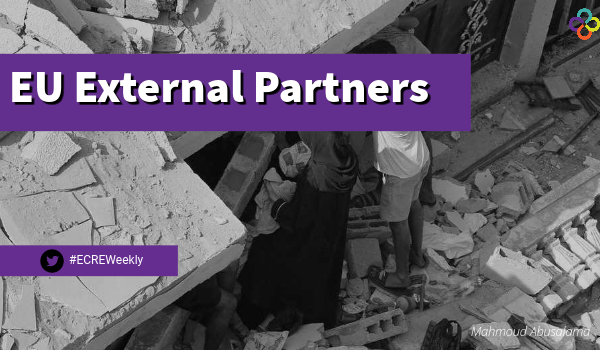As more than one million people have been displaced in Gaza the EU is in a diplomatic melt-down over response to the crisis while the Commission reportedly seeks a deal with Egypt to deter potential arrivals.
Since the deadly attack launched into Israel by Hamas on 7 October, the EU has struggled to find consensus. Initially, both Neighbourhood and Enlargement commissioner, Olivér Várhelyi and Commission President, Ursula von der Leyen, saw considerable pushback on their respective redefinitions of EU foreign policies. More than 70 MEPs have demanded the resignation of Várhelyi, after he misleadingly announced the suspension of “all payments” to the Palestinian authorities. In fact, the Commission has announced a tripling of humanitarian aid. Reportedly, diplomats at EU and member state level are fuming over von der Leyen, who expressed solidarity with the victims of the attack by Hamas but did not relay their calls for Israel to respect international law in Gaza during her recent trip to Israel. In a rare and direct rebuttal of the Commission President, EU foreign policy chief Joseph Borrell said Ursula von der Leyen did not speak for the EU on the matter, stating: “The common foreign policy of the European Union is an intergovernmental policy, it’s not a community policy. So the official position of the European Union with any foreign policy is being fixed by the guidelines of the high-level political decision in the European Union Council, chaired by president [Charles] Michel, and by the Foreign Affairs Council ministers, chaired by me. And the position is clear that we certainly defend the right of Israel to defend itself against the attack that has been suffering, but as any right, it has a limit. And this limit is international law and international humanitarian law”. According to an opinion published on 18 October by columnist and independent EU analyst, Shada Islam: “Repeated policy flip flops and competing messaging by top EU officials over the last 10 days have already dealt a huge, possibly fatal, blow to the bloc’s foreign policy credentials”. On 19 October, the European Parliament adopted a resolution calling for a “humanitarian pause” to allow the entry of food, water and medical supplies to the strip although 21 MEPs disapproved the text as it fell short of urging a ceasefire.
Weeks of intense bombing and complete seizure of the already impoverished Gaza strip with Israel cutting off water, food, medicine, and electricity supplies to the Strip has sparked a severe humanitarian crisis, left thousands dead and wounded and according to the United Nations Relief and Works Agency for Palestine Refugees in the Near East (UNRWA) displaced more than 1 million people almost half the population of Gaza with 2.1 million inhabitants, including some 1.7 million Palestine Refugees. 1.1 million civilians in Gaza’s just 140 square-mile territory – one of the most densely populated areas of the planet – have been warned by the Israeli army to move south. Stéphane Dujarric, spokesperson for the UN Secretary-General António Guterres, said in an official statement from New York that the measure affects “the entire population located north of Wadi Gaza including Gaza City. Dujarric considered such a mass movement impossible “without devastating humanitarian consequences”. The Rafah border crossing in the southern border between Gaza and Egypt – the only exit and entry point not under Israeli control – remains closed for both displaced de facto prevented from fleeing and humanitarian aid to enter the strip – although reportedly an agreement is underway to allow a limited number of 20 trucks to deliver aid. Egyptian President, Abdel Fattah el-Sissi has blamed the lack of humanitarian aid on airstrikes that targeted the Egyptian-Palestinian border and said it is in the best interest of Palestinians is to stay in Gaza. “The threat there is significant because it means the liquidation of this (Palestinian) cause,” el-Sissi said, adding “It’s important for its people to stay steadfast and exist on its land”. Egypt has maintained a decades-long position that allowing a mass exodus of Gazans would “revive the idea that Sinai is the alternative country for the Palestinians,” Mustapha Kamel al-Sayyid, a political scientist at Cairo University, told media.
While the EU is divided in terms of foreign diplomacy on the tragedy in Gaza, the consensus could be easier to establish when it comes to cutting off access for potential refugees out of Gaza to EU. Referencing the controversial MoU signed between EU and Tunisia in July and the events in Gaza, Vice-president of the European Commission, Margaritis Schinas stated on 10 October: “After this weekend’s events, the need to engage with Egypt is even more pressing”. Shinas added: “We are also stepping up now in this same area of cooperation with partners with Egypt. We will work with Egypt in the same vein”. The Egyptian coast guard is already receiving significant funding from the Commission to prevent departures towards Europe.
For further information:
- EU External Partners: Tunisia ‘Rejects’ EU Funding Casting Doubt on Deal as Reports of Abuse Continue to Mount, New Attack by So-called Libyan Coast Guard, October 2023
- ECRE, EU External Partners: Europe Remains Focused on Deterrence Amid Ongoing Controversy over Tunisia Deal, Floods Add Risk for Migrants in Libya as So-called Coast Guard Continues Pullback Operations, September 2023

